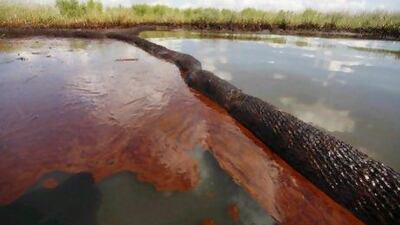ABP shareholders must have sighed with relief over the company's new share-swap deal and joint Arctic exploration plans with Rosneft, the Russian oil giant. Their fears that last year's Gulf of Mexico oil spill would render the British energy company unattractive to potential strategic partners have proved unfounded. BP's share price shot up on Monday after the weekend announcement, an indication of market approval.
The US$16 billion (Dh58.76bn) pact has been criticised by the green lobby and the US, with one critic dubbing BP "Bolshoi Petroleum". The environmental group Friends of the Earth says BP is vying to be "environmental villain number one", while Greenpeace warns that the world "is keeping a close eye on BP and any company involved in Arctic drilling".
For BP, it's a fair deal: its deepwater drilling expertise and global presence in exchange for access to crude from an area the size of the UK North Sea - and as prolific, some experts say. According to Russian estimates, the 125,000 square kilometres of the South Kara Sea could yield 51 billion tonnes of oil, or enough to meet global demand for more than four years.
The tie-up represents a new avenue of growth for the UK company and, given the political fallout in the US from the Gulf of Mexico disaster, a geographical balance to its business. The fatal Deepwater Horizon disaster in the Gulf of Mexico cost the company dear financially and in terms of its reputation and business relations with the US, where BP is most active.
"The alliance is based on mutual advantage and the recognition of great strengths," said Bob Dudley, the BP chief executive. It was the first significant cross-shareholding between a state-owned oil company and an international one and "defines a new template for how business can be done".
The green lobby is outraged at what it sees as an assault on the world's most fragile environment.
"Imagine the effects of a blowout on the scale of the Deepwater Horizon disaster, but this time thousands of miles from anywhere, in subzero conditions," said Ivan Blokov, the campaign director of Greenpeace Russia, adding that BP had learnt nothing from the spill.
"Although Greenland last year refused drilling concessions to BP because it lacked rigorous enough safety protocols, BP appears to have found a more willing back door to the pristine Arctic environment via the Russian firm Rosneft," he added. "Given that in 2009 alone, Rosneft had 12,000 pipeline breaks, 7,526 of which resulted in oil leaks, it would be an understatement to say we are concerned about these two companies operating together in the Arctic."
BP claims it has learnt a lot from the Deepwater Horizon disaster, lessons that it will apply to everything else it does.
The US is concerned that the deal poses a potential threat to its national and economic security given, BP's ownership of critical assets in the country and its position as a leading petroleum supplier to the country's military.
However, all the hand-wringing may turn out to be unnecessary. The deal is expected to be completed in a few weeks, but it will be years before the first well is drilled. "I'm sure [it will be] the 2020s before we see any oil production and until things start," the BP chairman, Carl-Henric Svanberg, told Bloomberg Television.
Until then, lots could happen. No one knows this better than Mr Dudley of BP himself. In 2008, as head of the TNK-BP joint venture, he was forced to flee the country in a bitter dispute over strategy with the Russian partners.
That issue may have been resolved, and Mr Dudley was warmly welcomed on his return to Moscow after his appointment as BP chief executive in October. In a few years' time, things might not be so cordial between Rosneft and BP. And the prize that is the Arctic might prove to be more a problem-spinner than a money-spinner for BP.
EDITOR'S PICK: Sky-high prices at the top of the world as Burj Khalifa opens new restaurant

